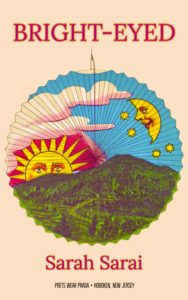 Review by Jordan E. Franklin
Review by Jordan E. Franklin
For those of you new to Sarah Sarai, she is a NYC-based poet and editor with a prolific publication record spanning several collections. While most poets experience a lag in their work and output, Sarai has experienced no such thing as evidenced by her latest book, Bright-Eyed. This new work manages to retain its power, intimacy, and tenderness despite its brevity.
According to Dictionary.com, the word “geography” refers to “the topographical features of a region.” Normally, this pertains to physical spaces such as countries and landscapes; Sarai begins Bright-Eyed with a dedication to her parents, alluding to this iteration of geography as she writes, “For my parents. Who broke with the East. Who moved us West.” This dedication is a callback to the “bright” in the title, reminding readers of the path the Sun takes daily as it makes its way across the sky. Throughout the poems, we follow an introspective speaker from place to place; including numerous cities and locations such as Malibu, Las Vegas, and even Stonewall in NYC.
Despite mentioning these recognizable locales, Sarai shows us that there are many different geographies at work in our lives – beyond East and West. Throughout Bright-Eyed’s pages, gender, racial, and spiritual geographies are as prominent and tangible as physical ones as her unnamed protagonist navigates, each with both humor and sobering insight. Sarai sets the tone of the collection in her opening poem, “Things always work out.” She writes:
Two feet off the ground,
you face west,
the direction of expansion,
not invention but reinvention
Here, the geographies of the physical and the spiritual are linked. Immigrating to a new place not only brings about a change of scenery but a change of identity, allowing for both emotional and self-introspection. Despite the fear of the unknown rippling under these lines, the poem ends on a hopeful note:
Thumbs through in search of
a promised earthly garden
of ethereal delight all the while
thanking all that is real.
Thanking all that is real
The repetition of the final line invokes prayer, both an attempt at self-assurance as well as an outward expression of gratitude for the trip, suggesting possibility awaits as long as one is willing to search for it.
In a later [prose]poem entitled “The Shiny You Have Missed,” Sarai suggests that the speaker’s wanderlust may very well be a side effect of traversing familial dysfunction as seen through the lines, “Why are lives not more banal than they are? Join us, my father and me, as we forage the neighborhood to peer through windows of real people homes. So that’s what it’s like to have family?” Here, Sarai proposes that, without a family as an anchor, one is left searching far and wide for either answers or a means of proper introspection. Ultimately, she notes that “newly mapped fixed points of celestial understanding reveal we are not where we thought we were. No escape from the self,” suggesting that no matter the speaker’s relationship with travel, whether as a vehicle for self-growth or escape, she is unable to flee from herself.
Sexuality is another geography explored. In the poem, “The first time I had sex,” Sarai’s protagonist traverses sexual politics recounting her dalliances with both men and women. At one point, she completely blurs the lines between the landscape and the body, recounting, “Our bodies are soft foothills/in spring” and reflecting that sex is itself an act of navigating bodies as the speaker both explores and is explored during intimacy.
Bright-Eyed is a work that is far more than the sum of its parts. It serves as a guidebook for those of us still traversing the many geographies in our lives. If you are in need of a book that makes you laugh and reflect, be sure to check out Sarai’s latest poetic excursion.
Bright-Eyed by Sarah Sarai
Poets Wear Prada, 2024, 53 pages, $18 [paperback]
ISBN: 1946116289
Jordan E Franklin received her MFA from Stony Brook Southampton where she served as a Turner Fellow. Her work has appeared in The Southampton Review, Breadcrumbs Magazine, Frontier, [PANK], and elsewhere. She was winner of the 2017 James Hearst Poetry Prize, and a finalist in the 2019 Nightjar Poetry Contest and the 2019 Furious Flower Poetry Prize.
